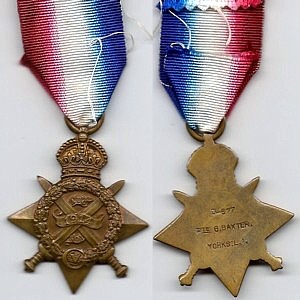1914 Star
| 1914 Star | |
|---|---|
 |
|
| Awarded by the Monarch of the United Kingdom and the British Dominions, and Emperor of India | |
| Country |
|
| Type | Campaign medal |
| Eligibility | British, Indian and Canadian forces |
| Awarded for | Campaign service |
| Campaign | France and Belgium 1914 |
| Clasps | 5th AUG.–22nd NOV. 1914 |
| Statistics | |
| Established | April 1917 |
| Total awarded | 365,622 |
| Order of wear | |
| Next (higher) | India General Service Medal (1909) |
| Next (lower) | 1914–15 Star |
| Related |
1914–15 Star British War Medal Victory Medal Territorial Force War Medal |
|
Ribbon bar without and with rosette |
|
The 1914 Star, colloquially known as the Mons Star, is a British World War I campaign medal for service in France or Belgium between 5 August and 22 November 1914.
The 1914 Star was authorised under Special Army Order no. 350 in November 1917 and by an Admiralty Fleet Order in 1918, for award to officers and men of the British and Indian Expeditionary Forces who served in France or Belgium between 5 August and midnight of 22–23 November 1914. The former date is the day after Britain's declaration of war against the Central Powers, and the closing date marks the end of the First Battle of Ypres.
A clasp was instituted in 1919, as published in Army Order no. 361 of 16 October 1919. The clasp, together with two small silver roses, was awarded to those who had served under fire or who had operated within range of enemy mobile artillery in France or Belgium during the period between 5 August and 22 November 1914. Altogether 365,622 medals were awarded, but the exact number of 1914 Stars awarded with a clasp is unknown since the clasp had to be claimed personally by the recipients, of whom a large number had either died before 1919 or neglected to apply. Approximately 145,000 clasps were awarded.
When the ribbon bar alone was worn, recipients of the clasp to the medal wore a small silver rosette button on the ribbon bar.
The 1914 Star was principally an Army award, although some Royal Navy personnel also qualified, having served ashore at Antwerp during the qualifying period. A few women who served in France and Belgium as nurses or auxiliaries during the qualifying period were also awarded the medal.
The majority of recipients were officers and men of the pre-war British army, specifically the British Expeditionary Force, also known as the Old Contemptibles, who landed in France soon after the outbreak of the War and who took part in the Retreat from Mons, hence the medal's nickname "Mons Star".
One hundred and sixty medals were awarded to members of the 2nd Canadian Stationary Hospital who served with the British Expeditionary Force, beginning on 6 November 1914. In addition a few Canadians who were attached to British units also received the medal.
...
Wikipedia
